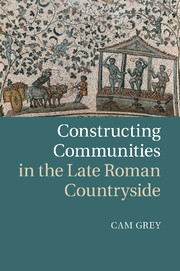Book contents
- Frontmatter
- Contents
- Preface
- List of abbreviations
- Map The late Roman world (sites and regions discussed in the text)
- Introduction
- Chapter 1 Constituting communities
- Chapter 2 What really matters
- Chapter 3 Small politics
- Chapter 4 Power as a competitive exercise
- Chapter 5 Resistance, negotiation, and indifference
- Chapter 6 Creating communities
- Chapter 7 Unintended consequences
- Conclusions
- Bibliography
- Index
Preface
Published online by Cambridge University Press: 07 September 2011
- Frontmatter
- Contents
- Preface
- List of abbreviations
- Map The late Roman world (sites and regions discussed in the text)
- Introduction
- Chapter 1 Constituting communities
- Chapter 2 What really matters
- Chapter 3 Small politics
- Chapter 4 Power as a competitive exercise
- Chapter 5 Resistance, negotiation, and indifference
- Chapter 6 Creating communities
- Chapter 7 Unintended consequences
- Conclusions
- Bibliography
- Index
Summary
Preface
Intuitively, we feel we know what a community is, even if we often find it hard to identify the precise characteristics that define it. The term evokes notions of common interest and regular interaction, shared identity and interdependence. Romantically, we might conjure up visions of picket fences and carefully swept streets, block parties and cookouts. More prosaically, we may think of neighborhoods and church committees, university campuses and online gaming forums. In each case, the fundamental ideas are the same: A community is simultaneously a sustaining social milieu for the individuals who belong to it, and a complex collection of obligations and expectations that those individuals must continue to meet in order to remain members. Membership confers the privilege of scrutinizing the claims of others to belong, but also opens one up to the same process of scrutiny. These complementary, potentially contradictory considerations underpin our experience of community on an everyday basis today, and we should expect them to have underpinned the everyday lives of the inhabitants of the ancient world as well.
Communities in the late Roman world are not hard to find. We observe (to take merely a few examples) communities of aristocrats, sometimes spread over considerable distances, sustained by the exchange of letters, literary trifles, and the produce of their estates; communities of barbarian foederati, settled in a variety of ways and on a multiplicity of terms within the boundaries of the empire; civic communities, experiencing transformations in their physical and ideological composition as they come to reflect Christian, rather than pagan, values and sensibilities; religious communities, which might come to blows with one another over matters of doctrine or interpretation of Scripture; and monastic communities from the deserts of Egypt to the mountains of eastern Gaul. It does not seem a stretch to assume that there were communities of agriculturalists in the countrysides of the Mediterranean world in the period as well, but the quotidian rhythms of those communities, the principles, expectations, and practices that sustained them across the breadth of that world, have not to date been the subject of a stand-alone study.
Information
- Type
- Chapter
- Information
- Constructing Communities in the Late Roman Countryside , pp. vii - xPublisher: Cambridge University PressPrint publication year: 2011
